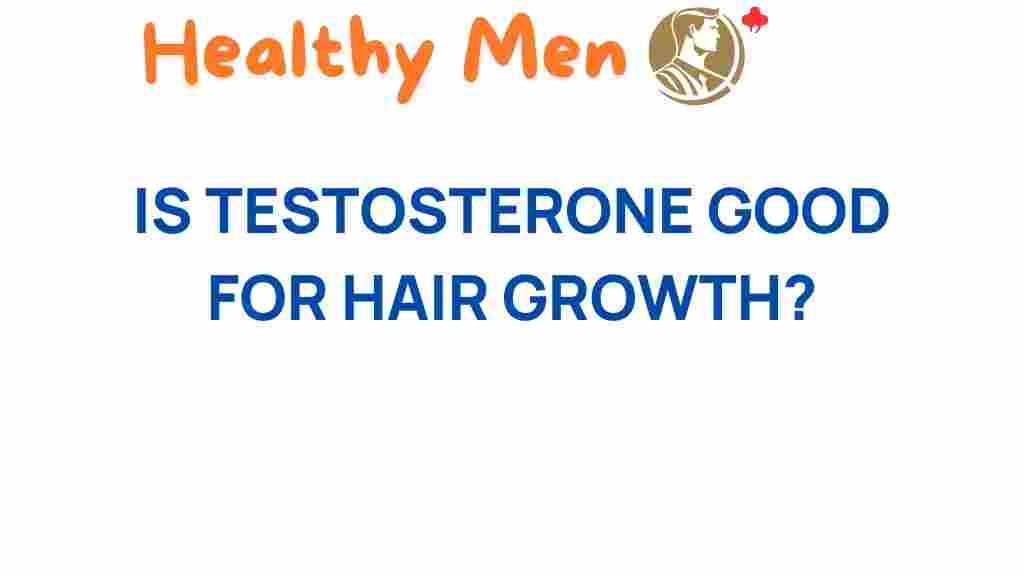Unraveling the Connection: Is Testosterone the Key to Hair Growth?
When it comes to understanding the intricate relationship between testosterone and hair growth, many people often find themselves puzzled. This connection is particularly significant for men, especially those experiencing male pattern baldness. In this article, we will explore how hormones, particularly testosterone, influence hair growth, the role of androgens, and effective methods for promoting a healthy scalp. We will also delve into the broader context of wellness, hair restoration, and the importance of maintaining optimal hormonal health.
The Role of Testosterone in Hair Growth
Testosterone, a key male hormone, is produced primarily in the testes, but also in smaller amounts by the adrenal glands. It plays a crucial role in various bodily functions, including muscle mass, mood regulation, and, importantly, hair growth. The relationship between testosterone and hair follicles is complex, involving the action of androgens, a group of hormones that includes testosterone.
While testosterone is often associated with male characteristics, it is also present in females, albeit in lower concentrations. The balance of testosterone and other hormones in the body can significantly influence hair health and growth patterns.
Understanding Male Pattern Baldness
Male pattern baldness, or androgenetic alopecia, is a common condition that affects a significant percentage of men. It is characterized by a receding hairline and thinning of hair on the crown. This condition is largely influenced by genetics and the body’s hormonal balance, particularly the level of dihydrotestosterone (DHT), a derivative of testosterone.
DHT is known to bind to hair follicle receptors, leading to a shortening of the hair growth cycle and miniaturization of the follicles. As a result, hair becomes thinner and weaker, ultimately leading to hair loss. Understanding this process is essential for those seeking effective solutions for hair restoration.
The Interplay Between Hormones and Hair Health
The connection between hormones and hair growth is not limited to testosterone alone. Other hormones, such as estrogen and progesterone, also play vital roles in maintaining healthy hair. The balance of these hormones can be disrupted by various factors, including:
- Age: Hormonal levels fluctuate as we age, affecting hair growth.
- Stress: High-stress levels can lead to hormonal imbalances, contributing to hair loss.
- Diet: Nutritional deficiencies can impact hormone production and hair health.
- Health Conditions: Hormonal disorders such as polycystic ovary syndrome (PCOS) can affect hair growth in women.
Step-by-Step Process for Promoting Hair Growth
For individuals looking to enhance their hair growth, understanding the role of hormones, particularly testosterone, is crucial. Here’s a step-by-step process to promote healthy hair growth:
1. Evaluate Hormonal Levels
Start by assessing your hormonal levels through a blood test. Consult with a healthcare provider to check testosterone, DHT, estrogen, and other relevant hormone levels. This evaluation will provide insight into potential imbalances affecting your hair growth.
2. Optimize Diet and Nutrition
A balanced diet rich in vitamins and minerals can support hormonal health and hair growth. Focus on:
- Protein: Essential for hair structure; include lean meats, fish, and legumes.
- Omega-3 Fatty Acids: Found in fish, flaxseeds, and walnuts, these promote scalp health.
- Vitamins: Vitamins A, C, D, E, and B-complex are vital for hair growth.
- Minerals: Zinc and iron play crucial roles in hair health.
3. Implement Scalp Care
Healthy scalp care is essential for promoting hair growth. Consider the following:
- Regular Cleansing: Keep the scalp clean to prevent clogged follicles.
- Exfoliation: Use gentle exfoliants to remove dead skin cells and promote circulation.
- Massage: Scalp massages can stimulate blood flow to hair follicles.
4. Consider Supplements
In some cases, dietary supplements can help address nutritional deficiencies. Look for supplements containing:
- Biotin: Known for its role in promoting healthy hair.
- Vitamin D: Important for hair follicle cycling.
- Iron: Essential for blood circulation and oxygen supply to hair follicles.
5. Explore Hair Restoration Options
If you are experiencing significant hair loss, consider consulting a specialist about hair restoration options. Treatments may include:
- Minoxidil: An over-the-counter topical treatment that stimulates hair growth.
- Finasteride: A prescription medication that reduces DHT levels.
- Hair Transplant Surgery: A surgical option for more permanent restoration.
6. Manage Stress
Stress management is crucial for maintaining hormonal balance and promoting hair growth. Consider incorporating the following practices into your routine:
- Mindfulness and Meditation: Techniques to reduce stress and promote relaxation.
- Regular Exercise: Physical activity can help regulate hormones and improve mood.
- Sufficient Sleep: Aim for 7-9 hours of quality sleep each night to support overall health.
Troubleshooting Tips for Hair Growth Issues
If you are following the steps outlined above and still experiencing hair growth issues, consider the following troubleshooting tips:
1. Reassess Hormonal Levels
Hormonal imbalances can be complex. If your initial tests showed normal levels, you might want to retest or consult an endocrinologist for a more in-depth analysis.
2. Evaluate Your Diet
Sometimes, nutritional deficiencies can go unnoticed. Keep a food diary to identify any gaps in your diet and consult a nutritionist if needed.
3. Adjust Your Hair Care Routine
What works for one person may not work for another. Experiment with different shampoos, conditioners, and treatments to find what best suits your hair type.
4. Seek Professional Guidance
If you notice significant hair loss or changes in your scalp health, consult a dermatologist or trichologist for personalized advice and treatment options.
Conclusion
Understanding the connection between testosterone and hair growth is essential for anyone experiencing hair loss, particularly male pattern baldness. By optimizing hormonal levels, focusing on nutrition, and maintaining a healthy scalp, individuals can enhance their chances of promoting healthy hair growth. Remember, hair restoration is a journey that often requires a multifaceted approach. Embrace the process, and prioritize your overall w wellness for the best results.
For more information on hormonal health and hair restoration, check out this comprehensive guide. Additionally, you can learn about the best scalp care routines here.
This article is in the category Conditions and created by healthymen Team
